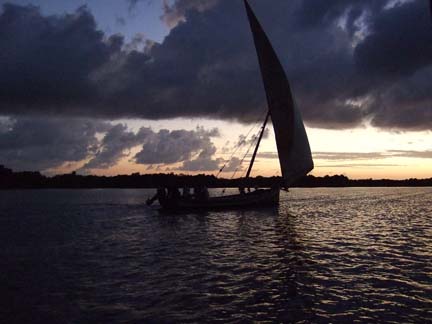
Dhow near Lamu at sunset
I am writing this from the exquisite Island of Lamu in Kenya. As someone who has spent over thirty years rambling around Yemen, across the Gulf of Aden, it is quite eye-opening to take a look up at the southern part of the Arabian Peninsula from an African perspective, especially a view that has been influenced in many ways by earlier generations of migrants from Yemen. It would be nice if I was here only because it is such a beautiful tourist spot with a rich cultural heritage, and indeed all this is nice, but I am actually attending an annual seminar on the Horn of Africa hosted by the Rift Valley Institute. The organizers recognized that cultural history and contemporary politics in the Horn can hardly be separated from Yemen, which lies so close across the Red Sea and Gulf of Aden. Hence I was invited to contribute on the links between Yemen and the Horn and also to discuss the relevance of Islam and the contentious issue of “Islamism.â€
Our first day was a marathon, for my three lectures as well as the 40 some students who began hearing from a host of lecturers from 8 am until 6:30, followed by a communal dinner. Monday continued the talks, but with the merciful break of a dhow trip in the later afternoon. Today, Tuesday, the air in our open-air conference center (The Factory) is filled with information on Somalia, Ethiopia and Eritrea, not to mention the refugees from these three countries of the Horn. Tomorrow I have the honor of giving a general lecture for the elders of Lamu. The seminar continues through Friday, six very full days with as much information packed in as a semester long university course.
But let’s do the un-academic thing for now and take a dhow ride. Stepping into a traditional teak-wood, lateen sail dhow yesterday was almost a spiritual experience. Having conducted research on early centuries of Arab navigation, the historian in me was able to enter an ethnographic time machine and do some participant sailing. There were six of us, a fellow lecturer who specializes in Somalia, another colleague who is a Professor of History in Ethiopia, and three members of development organizations. Our crew of three, led by the reflective Abu, were in charge of a very traditional dhow (only the supplemental motor brought it into the present) with full sail catching the wind. The lecturers and students were being ferried in several dhows to the nearby island ruins of Taqwa, a Muslim settlement that was apparently abandoned about two centuries ago. Guides from the Lamu Museum gave us the tour and allowed us to soak our feet, among the scrambling crabs, in the ocean-drenched sand facing out to the sea.
We had the slow boat, not a racer, but a sturdy craft. At one point a faster boat came nearby with the crew and passengers singing a medley of Oldies, from John Denver to rock over a steady drumbeat. Hasan, one of our crew, jumped over to the other ship as Abu explained that Hasan could not resist music. The fun fest in the other boat was in stark contrast to our own quiet group, putting us to shame. Among the passengers on the nearby boat was an obvious European woman dressed in a modified hijab and armed with a camera, seemingly fascinated by us as she kept clicking away on her digital camera. Should she have a Facebook page and my picture appear there, I will know that globalization has truly made prisoners of us all.
Daniel Martin Varisco